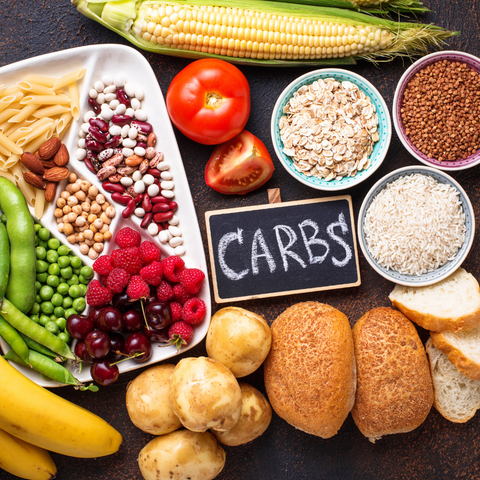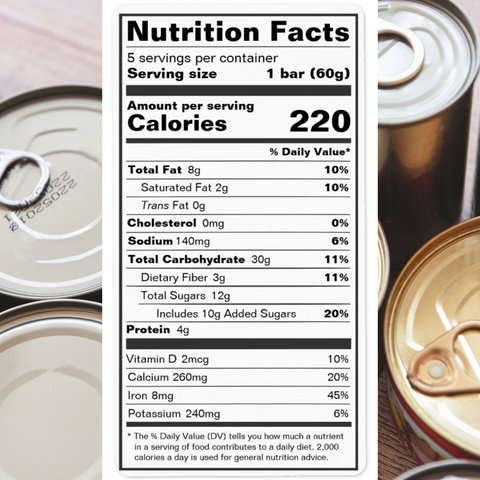Are Carbs and Sugar the Same Thing?

🎧 On the go? Listen to this episode on The GOOD IDEA Audio Blog, available on Spotify or Apple Podcasts.
Are carbs and sugar the same thing? The words “carbohydrates” and “sugar” are often used interchangeably, leading to confusion about their roles in our diets. In reality, sugar is a specific type of carbohydrate. In this blog, we delve into the differences between carbs and sugar, their effects on the body, and how to make informed choices for a balanced diet.
Types of Carbohydrates

Under the umbrella of carbohydrates there are two main types: simple carbohydrates and complex carbs.
Simple Carbohydrates are quickly absorbed by the body. Their chemical structures are very simplistic so they are easily broken down by the body into glucose. Simple carbs come in two forms, refined sugar and naturally occurring sugar. Refined sugars are commonly found in sugary drinks and bakery items where they have been heavily processed with the natural fiber and nutrients removed. Naturally occurring sugars are often found in healthy foods, like fruit and milk. These types of sugar have not been heavily processed, so they still hold onto their vitamins, minerals, and fibers.
Complex carbs, on the other hand, are a more sustained energy source due to their high fiber content. Complex carbs are generally healthier than their simple counterparts. They tend to have a higher quantity of vitamins, minerals and fiber per gram. Grains, legumes, and vegetables are all great sources of complex carbs.
Defining Carbohydrates and Sugar

Carbohydrates are macronutrients that provide energy to the body. As discussed above, we can break down carbohydrates into being either simple or complex. We can further categorize carbohydrates as being either sugars, starches, or fiber. The term sugar refers specifically to simple carbohydrates, such as glucose, fructose, and sucrose, found naturally in fruits and vegetables or added to foods.
How Does the Body Processes Carbs and Sugar?
When we eat carbohydrates the body breaks them down into glucose. While both simple and complex carbs are broken down into glucose, the molecular structure of simple carbs is much smaller and easier to pull apart. So, the breakdown process is much faster for simple carbs than complex.
After breaking the carbs down into glucose, the body uses what it immediately needs to power your brain function, metabolic processes, and physical activity. The excess is stored as glycogen in the liver and muscles in case you need some quick fuel later. Any remaining glucose is converted into fat.
Impact on Blood Sugar Levels

Simple sugars cause rapid spikes in blood sugar levels, especially when they are refined. This leads to energy crashes later in the day, irritability (think “hangry”) and food cravings. However, we can help mitigate this spike in blood sugar when we pair a simple sugar with protein (like how milk naturally contains simple sugar and protein). We can also help to reduce glucose excursions by having fiber before our simple carbs or by drinking a GOOD IDEA.
Complex carbohydrates, especially those high in fiber, result in slower glucose release, promoting stable blood sugar levels. These molecules take time to break down so they are released at a slower rate.
Role in a Healthy Diet
Carbohydrates are an essential macronutrient. They help to fuel energy production, brain function, and muscle activity. However, when we consume more simple carbohydrates (aka sugar) than our physical activity levels needs, it can be stored as fat and be detrimental to our metabolic health.
Choosing complex carbohydrates from whole foods can help us to increase our nutrient intake and sustain our energy levels throughout the day without the negative impact on our metabolism.
Understanding Sugar Content in Foods

Food labels can be tricky. Many people working to stabilize their blood sugar or lose weight look a the line for “total carbohydrates” when choosing a food. However, if you look under this header, you will find it broken down by dietary fiber, total sugars, and added sugars. These three subsections are the areas in which we want to focus. A food high in fiber (aka complex carbohydrates) is generally metabolically healthy. Whereas, a foods high in added sugars is a food that you would likely eat sparingly or to specifically fuel high intensity exercise (and sometimes they can be high in fructose which isn’t the best option for activity but we can get into that in another blog). In general, shoot for high dietary fiber content with minimal (or no) added sugars. When possible, opt for natural sources of sugar, such as fruits, for the added nutrients.
The Verdict: Sorting out Sugar from Carbs
Carbs and sugar are not the same; rather, sugar is a type of carbohydrate. Understanding their distinctions empowers us to make informed dietary choices, prioritizing nutrient-dense foods while moderating sugar intake for optimal health and well-being.
Author: Dr. Colleen Gulick, Ph.D. (ExPhys), MS (ExPhys), BS (BioE), EIT (ME), CSCS




